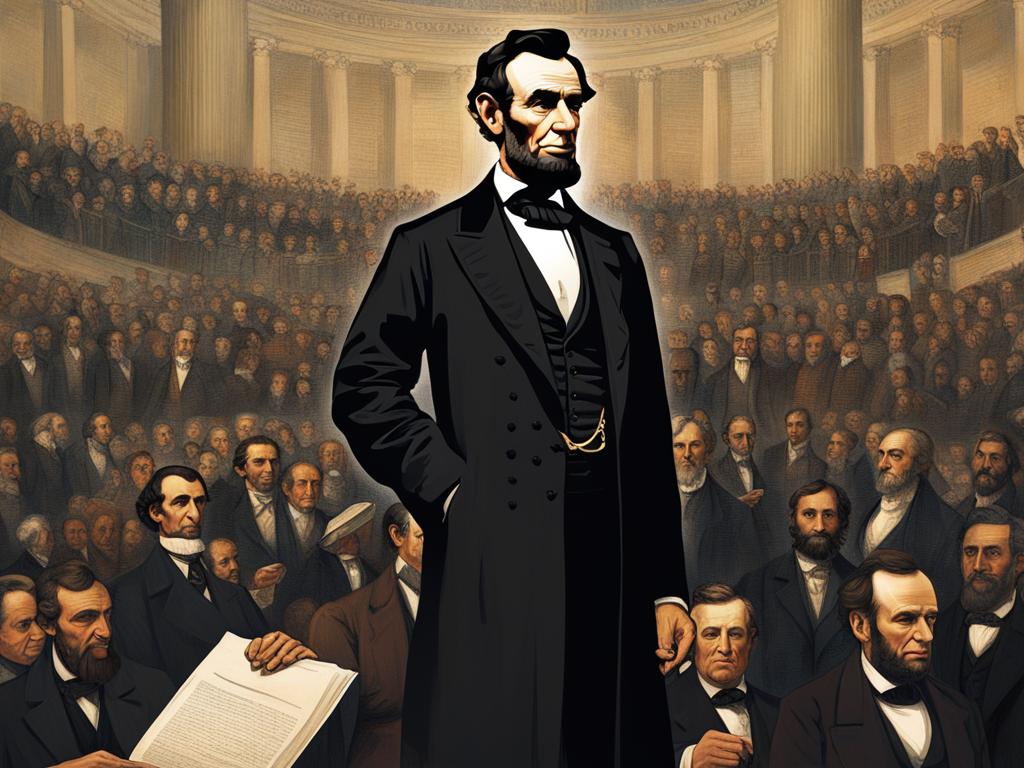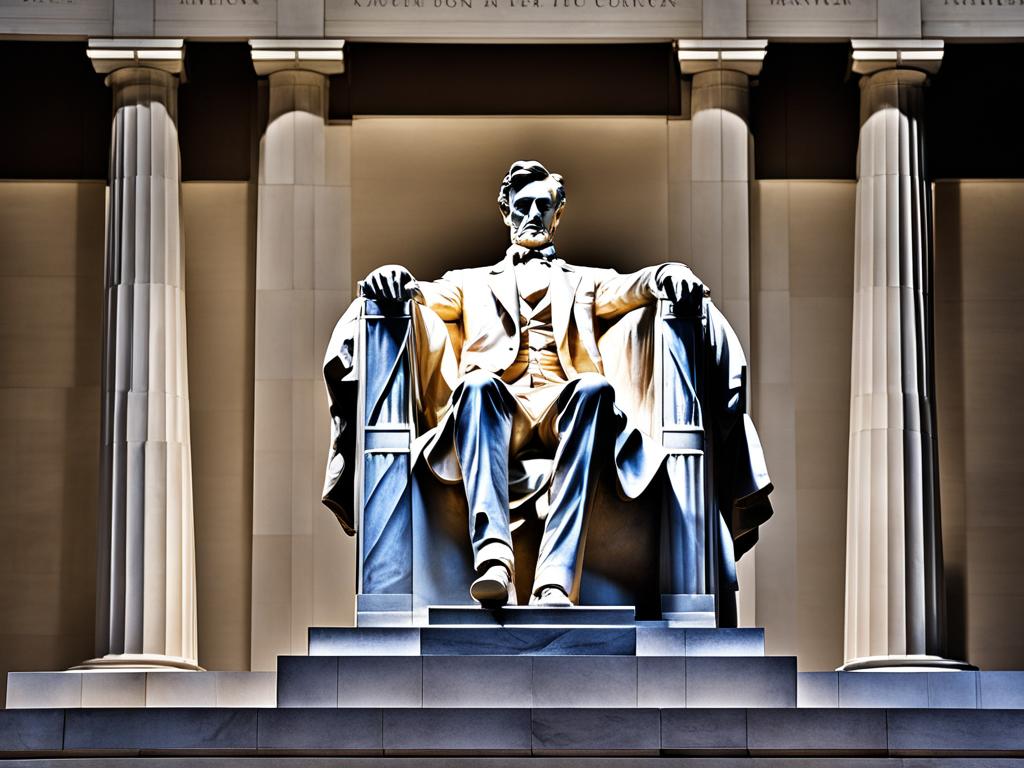Welcome to our article on Abraham Lincoln, commonly known as the “Great Emancipator.” In this piece, we will explore Lincoln’s role in ending slavery during the American Civil War and his lasting impact on the United States and the concept of freedom.
Abraham Lincoln is celebrated for his efforts to unite a divided nation and free millions of enslaved African Americans. His leadership during one of the most challenging periods in American history is widely recognized. However, there are different perspectives on Lincoln’s stance on slavery and his motivations behind emancipation.
While some view Lincoln as a hero who moved a nation and helped liberate a people, others argue that his views on slavery were more pragmatic and evolving. The legacy of Abraham Lincoln and his impact on the United States continue to be subjects of debate and analysis.
Key Takeaways:
- Abraham Lincoln is often referred to as the “Great Emancipator” for his role in ending slavery during the American Civil War.
- There are different perspectives on Lincoln’s stance on slavery and his motivations behind emancipation.
- His efforts to unite a divided nation and free enslaved African Americans have left a lasting mark on the United States.
- The Emancipation Proclamation, issued by Lincoln in 1863, is considered a defining moment in his presidency and the fight against slavery.
- The legacy of Abraham Lincoln is celebrated but also criticized, with debates on the impact of his actions and views.
Lincoln’s Views on Slavery
In the early years of Lincoln’s public career, he was considered “antislavery,” opposing the expansion of slavery but not advocating for immediate emancipation. He was not known as a vocal abolitionist like Harriet Beecher Stowe, whose novel Uncle Tom’s Cabin played a significant role in shaping public opinion on the immorality of slavery.
Lincoln’s views on slavery evolved over time, and he skillfully led the majority of Americans towards the idea that slavery was unacceptable. He took a pragmatic approach, using emancipation as a tactic to defeat the South and damage its economy during the Civil War.
“Fellow citizens, we cannot escape history… The fiery trial through which we pass will light us down in honor or dishonor to the latest generation.” – Abraham Lincoln
The Emancipation Proclamation and its Limitations
The Emancipation Proclamation, issued by Lincoln in January 1863, marked a significant moment in his presidency and the fight against slavery.
However, it’s essential to understand that the proclamation did not immediately result in the freedom of all slaves. Its scope was limited to Confederate states that were in rebellion against the Union, excluding enslaved individuals in Union states.
While the Emancipation Proclamation symbolized the Union’s commitment to abolition, it strategically aimed to weaken the Confederacy by undermining their labor force and gaining support from European countries, who were opposed to slavery.
Furthermore, the Emancipation Proclamation did not apply to border states such as Delaware, Maryland, Kentucky, and Missouri, which remained loyal to the Union. These states were allowed to maintain slavery until the ratification of the Thirteenth Amendment in 1865.
Lincoln’s goal was not immediate and total abolition, but rather to utilize emancipation as a means to disrupt the economy of the Confederate states and secure political support for the Union cause.
While the Emancipation Proclamation did not achieve immediate freedom for all enslaved individuals, it represented a decisive step towards the ultimate eradication of slavery in the United States.

Lincoln’s Legacy and Criticisms
The legacy of Abraham Lincoln is both celebrated and criticized. The iconic Lincoln Memorial, a testament to his enduring impact, stands as a symbol of the reunited Union. Yet, this memorial, along with other Civil War memorials, has become a source of controversy in recent times.
Debates over the meaning and presence of Confederate statues have sparked intense discussions about Lincoln’s legacy. Critics argue that his actions failed to fully deliver on the promises of emancipation. They argue that racial segregation and systemic racism persisted long after Lincoln’s death, highlighting a gap between the ideal of emancipation and the realities faced by African Americans.
“Our nation’s capital—yes, the symbol of our democracy—holds within its borders both the Lincoln Memorial and Confederate statues. These conflicting symbols force us to confront uncomfortable truths about our history and the ongoing struggle for racial equality.”
The Civil Rights Movement, led by notable figures like Martin Luther King Jr., further brought attention to the complexities of Lincoln’s legacy. It shed light on the challenges faced by African Americans in their fight for equal rights and opportunities, emphasizing the need for progress beyond mere symbolism.
Although Lincoln’s legacy endures, it serves as a reminder that progress in racial equality requires ongoing commitment and action. The debates surrounding his legacy prompt us to critically examine the lingering effects of racial segregation and the continued struggle for civil rights.

The Civil Rights Movement: A Catalyst for Change
The Civil Rights Movement of the 1950s and 1960s marked a turning point in the fight for racial equality. Led by courageous activists like Martin Luther King Jr., it challenged the systemic racism and discrimination that persisted long after Lincoln’s time.
The movement called for an end to racial segregation and the protection of voting rights for African Americans. Through nonviolent protests, such as the Montgomery Bus Boycott and the March on Washington, activists sought to bring about lasting change.
The work of the Civil Rights Movement continues to inspire and shape the ongoing fight against racial injustice. It serves as a powerful reminder of the long road towards equality and the importance of maintaining a vigilant commitment to justice and inclusivity.
Conclusion
The legacy of Abraham Lincoln as the “Great Emancipator” remains a significant part of American history. His impact on the United States was profound, as he played a crucial role in uniting a divided nation and bringing an end to the institution of slavery.
Lincoln’s efforts to promote freedom and equality have left a lasting mark on the United States. While there may be differing interpretations and criticisms of his actions, the importance of his contributions cannot be denied. His leadership during the Civil War and the issuing of the Emancipation Proclamation were pivotal moments in the fight against slavery.
The ongoing debates surrounding Lincoln’s legacy serve as a reminder of the complexities of history and the struggles for equality and justice that continue to shape the United States. It is a testament to Lincoln’s impact that his name and accomplishments are still discussed and analyzed today, influencing our understanding of the past and shaping our aspirations for the future.
FAQ
Was Abraham Lincoln an abolitionist?
In the early years of his public career, Lincoln opposed the expansion of slavery but did not advocate for immediate emancipation. His views on slavery evolved over time.
What was Lincoln’s role in ending slavery?
Lincoln’s skillful leadership during the American Civil War and his issuance of the Emancipation Proclamation played a significant role in weakening the Confederacy and moving towards the end of slavery.
Did the Emancipation Proclamation free all slaves?
No, the Emancipation Proclamation applied only to slaves in Confederate states that were in rebellion against the Union. Some border states that remained loyal to the Union were allowed to maintain slavery.
What is the legacy of Abraham Lincoln?
Lincoln is celebrated for his efforts to unite a divided nation, free enslaved African Americans, and promote freedom. However, there are also criticisms regarding the long-lasting systemic racism that persisted after his death.
Why are there controversies surrounding Civil War memorials?
Civil War memorials, including the Lincoln Memorial, have become sources of controversy due to debates over their meaning and the continued presence of Confederate statues. Critics argue that Lincoln’s actions did not fully live up to the promises of emancipation.
